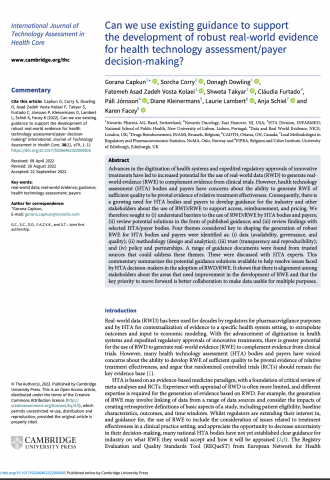
Advances in the digitization of health systems and expedited regulatory approvals of innovative treatments have led to increased potential for the use of real-world data (RWD) to generate real-world evidence (RWE) to complement evidence from clinical trials. However, health technology assessment (HTA) bodies and payers have concerns about the ability to generate RWE of sufficient quality to be pivotal evidence of relative treatment effectiveness. Consequently, there is a growing need for HTA bodies and payers to develop guidance for the industry and other stakeholders about the use of RWD/RWE to support access, reimbursement, and pricing. We therefore sought to (i) understand barriers to the use of RWD/RWE by HTA bodies and payers; (ii) review potential solutions in the form of published guidance; and (iii) review findings with selected HTA/payer bodies. Four themes considered key to shaping the generation of robust RWE for HTA bodies and payers were identified as: (i) data (availability, governance, and quality); (ii) methodology (design and analytics); (iii) trust (transparency and reproducibility); and (iv) policy and partnerships. A range of guidance documents were found from trusted sources that could address these themes. These were discussed with HTA experts. This commentary summarizes the potential guidance solutions available to help resolve issues faced by HTA decision-makers in the adoption of RWD/RWE. It shows that there is alignment among stakeholders about the areas that need improvement in the development of RWE and that the key priority to move forward is better collaboration to make data usable for multiple purposes.
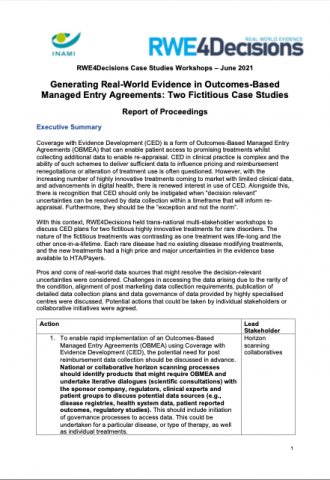
RWE4Decisions held trans-national multi-stakeholder workshops to discuss CED plans for two fictitious highly innovative treatments for rare disorders. The nature of the fictitious treatments was contrasting as one treatment was life-long and the other once-in-a-lifetime. Each rare disease had no existing disease modifying treatments, and the new treatments had a high price and major uncertainties in the evidence base available to HTA/Payers.
Pros and cons of real-world data sources that might resolve the decision-relevant uncertainties were considered. Challenges in accessing the data arising due to the rarity of the condition, alignment of post marketing data collection requirements, publication of detailed data collection plans and data governance of data provided by highly specialised centres were discussed. Potential actions that could be taken by individual stakeholders or collaborative initiatives were agreed.
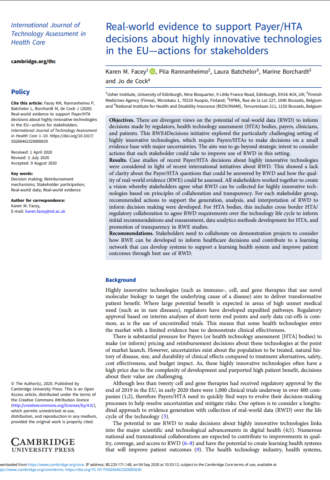
This paper goes beyond strategic intent to consider actions that regulators, HTA bodies, Payers, clinicians and patients could take to improve the use of real-world data to inform their decision. Case studies of recent Payer/HTA assessments about highly innovative technologies showed that there was a lack of clarity about the Payer/HTA questions that could be answered by RWD and how the quality of real-world evidence (RWE) could be assessed. For each stakeholder group, recommended actions to support the generation, analysis and interpretation of RWD to inform decision-making were developed.
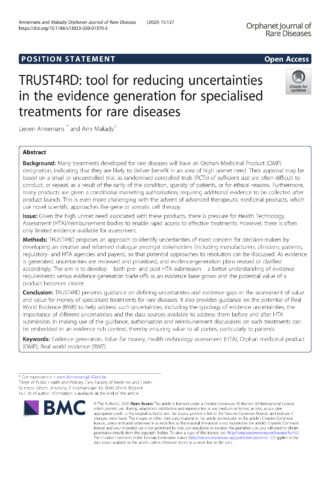
Authored by Professor Lieven Annemans, University of Ghent. This paper develops a technical but pragmatic tool and methodology that allows the uncertainties in evidence for a specialised treatment for a rare disease to be made explicit, to be prioritized and to be addressed in an adequate and timely way. Additionally, the paper provides guidance on the potential of real-world evidence (i.e. data collected outside the context of randomised controlled clinical trials; RWE) to help address such uncertainties.
Workshop Reports
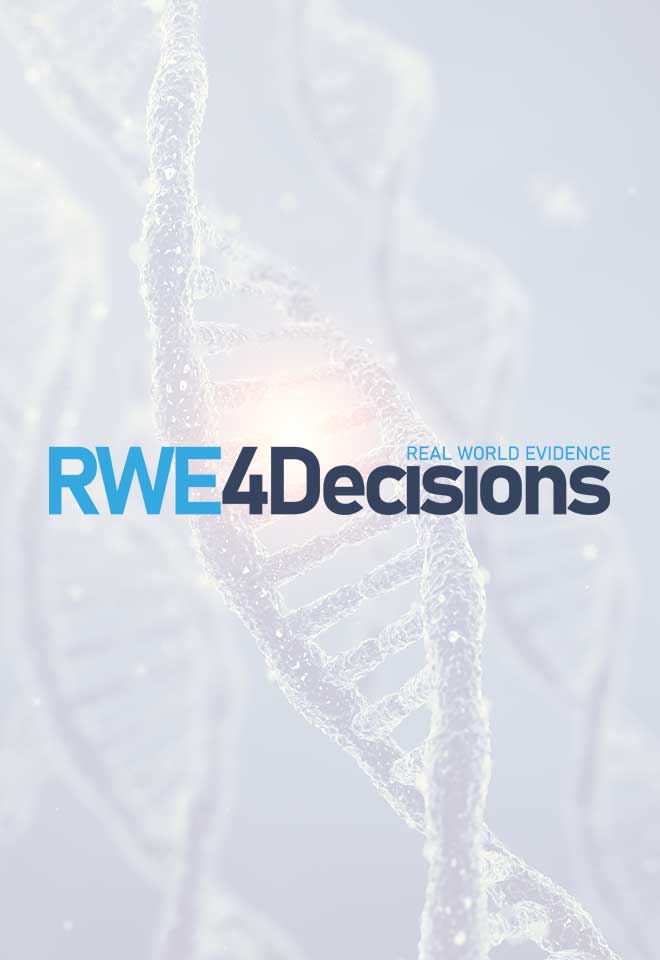
These slides capture the key public learnings stemming from confidential workshops convened by INAMI in September 2020 to pilot an agile scientific consultation process with individual companies. Three highly innovative technologies in development were discussed individually with a Core Advice Panel composed of Payers and HTA/regulatory bodies, an EMA Patient expert and a clinical expert, resulting in non-binding advice to inform real-world evidence generation plans.
Read more

RWE4Decisions held trans-national multi-stakeholder workshops to discuss CED plans for two fictitious highly innovative treatments for rare disorders. The nature of the fictitious treatments was contrasting as one treatment was life-long and the other once-in-a-lifetime. Each rare disease had no existing disease modifying treatments, and the new treatments had a high price and major uncertainties in the evidence base available to HTA/Payers.
Pros and cons of real-world data sources that might resolve the decision-relevant uncertainties were considered. Challenges in accessing the data arising due to the rarity of the condition, alignment of post marketing data collection requirements, publication of detailed data collection plans and data governance of data provided by highly specialised centres were discussed. Potential actions that could be taken by individual stakeholders or collaborative initiatives were agreed.
Read more
Call to Action
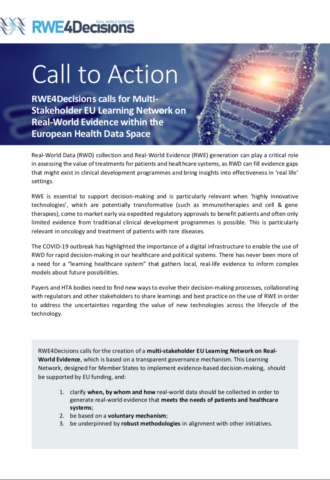
Policy Brief
RWE4Decisions calls for a Multi-Stakeholder EU Learning Network on RWE within the European Health Data Space
The Call to Action will be launched at the "Health Innovation - the European Health Data Space and Real-World Evidence" event on 10 November.
Read more
Press Release
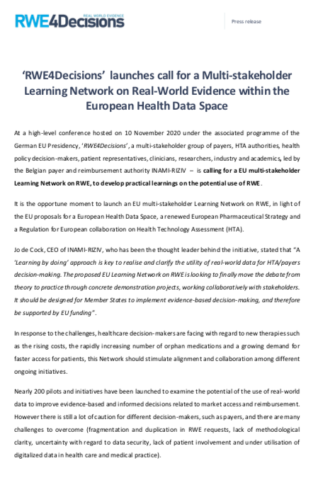
Press Release
10 November Conference: Health Innovation – the European Health Data Space and Real-World Evidence
On November 10, the RWE4Decisions’ initiative hosted a conference on ‘Health Innovation – the European Health Data Space and Real World Evidence’, hosted under the auspices of the Federal Ministry of Health associated programme of the German EU Presidency.
Read more
Past INAMI Papers
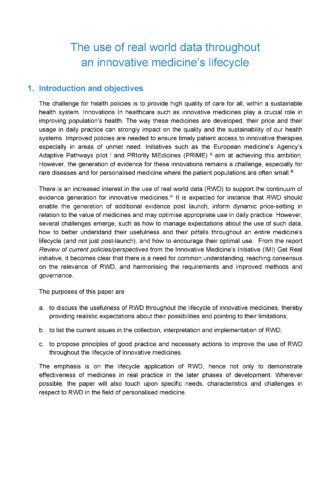
The paper discusses the usefulness of RWD throughout the lifecycle of innovative medicine, and the current issues in the collection, interpretation and implementation of RWD. In addition good practice principles and necessary actions to improve the use of RWD are proposed.
Read more
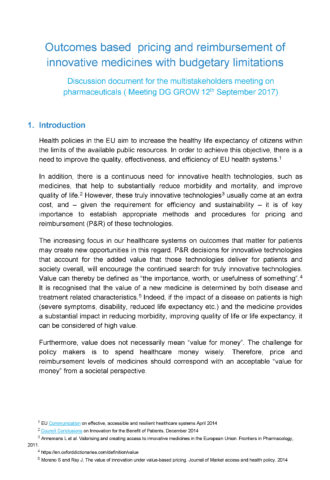
This paper outlines an overview of the principles of “value based pricing“ and reimbursement, followed by a discussion of the current uncertainty regarding clinical and financial outcomes at time of market access of innovations. A proposal is presented for outcomes based agreements that deal with this uncertainty and its causes.
Read more